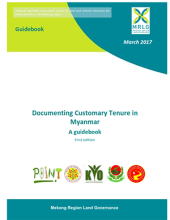Land Library
Welcome to the Land Portal Library. Explore our vast collection of open-access resources (over 74,000) including reports, journal articles, research papers, peer-reviewed publications, legal documents, videos and much more.
/ library resources
Showing items 1 through 9 of 18.En el año 2000, se intensificaron las amenazas de expansión de la frontera agrícola, extracción de madera, cacería comercial y pesca masiva no controlada, creándose conflictos entre aripaeños y foráneos por el uso del bosque y sus espacios.
In the Mekong region, conflicts between local communities and large scale land concessions are widespread. They are often difficult to solve.
This dialogue provided a way for the land community to collaboratively explore challenges and opportunities related to the recognition of indigenous, ethnic minority and customary tenure rights in the Mekong region in order to:
This guidebook provides conceptual, legal and practical tools and resources to help civil society organizations guide communities through the process of documenting customary tenure at the local level.
The « Environment and Natural Resources Code of Cambodia » (Sixth Draft – – 20 November 2016) is a very extensive proposed law (535 pages !) which will have, if adopted, major impacts on many aspects of Cambodian development (Mines, Energy, Urban planning, etc..) but is particularly important for
This short thematic study challenges the assumption that the legal framework to recognize and protect indigenous peoples’ (IP) customary lands is adequate and that the challenge lies in its implementation.
This short thematic study challenges the assumption that the legal framework to recognize and protect indigenous peoples’ (IP) customary lands is adequate and that the challenge lies in its implementation.
In the Mekong region, conflicts between local communities and large scale land concessions are widespread. They are often difficult to solve.
Maroba dos Teixeiras foi reconhecida como comunidade quilombola pela Fundação Palmares no 26 de janeiro de 2009. Comunidades quilombolas são aqueles grupos formados por sujeitos afrodescendentes que resistiram ao sistema escravista que perdurou dos séculos XVI a XIX no Brasil.








